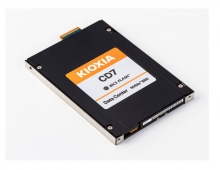
Intel Centerton SoC To Debut in HP's CPU-agnostic Server
HP will release a processor-agnostic chassis called Gemini later this year geared for low power servers. Intel's "Centerton", a dual-core, 64-bit Atom SoC, will be the first CPU to ship in the system with ARM server SoCs following in the future.
HP today announced that for the next phase of Project Moonshot, the company's initiative to develop low-energy servers, it has chosen to lead with server cartridges featuring the Intel Atom processor codenamed "Centerton" for its initial production system.
Intel said previously Centerton is a 6W, 32 nm SoC that supports virtualization, error correction code and has some integrated I/O.
HP has designed Project Moonshot to help its customers significantly reduce server complexity, energy use and costs. The program reinvents the traditional approach to hyperscale computing by leveraging workload-optimized, extreme low-energy "server cartridges" in a unique enclosure that pools resources across thousands of servers.
HP said it has chosen to lead with Centerton server cartridges in its initial production server system, codenamed Gemini, due to the processor's data-center-class features, such as 64-bit support, hardware virtualization (VTx), error correcting code (ECC) memory, lower power requirements, increased performance and broad software ecosystem.
Traditional servers rely on dedicated components, including management, networking, storage, power cords and cooling fans in a single enclosure. However, Gemini enclosures are capable of supporting thousands of servers per rack that share these components.
The newly designed Gemini server system with Centerton server cartridges has been designed for web serving, offline analytics and hosting.
"Customers leveraging hyperscale computing are looking to realize radical space, cost and energy savings, and with Project Moonshot we've introduced the breakthrough approach needed to achieve these savings," said Paul Santeler, vice president and general manager, Hyperscale Business Unit, Industry-standard Servers and Software, HP. "Together with Intel's enhanced processor features and collaboration, we're able to transform the server industry by enabling customers to exceed the limits of what was previously possible in hyperscale computing."
HP and Intel are collaborating on additional extreme low-energy Gemini server cartridges based on future generations of the Intel Atom micro architecture.
The Gemini server system incorporating Centerton-based compute cartridges is in use in HP?s Discovery lab in Houston and will soon be offered by HP to customers for testing. It is expected to begin shipping in early production by year?s end.
HP has a development roadmap of Gemini server cartridges incorporating processors from other vendors for use within the Gemini system. The conmpany declined to name what other ARM SoCs beyond the Calxeda CPU it will show running in its lab where end users will be able to run test applications.
Among the other players, Applied Micro announced last year its plans for a 64-bit ARM server SoC. Dell said it is using Marvell's Armada XP in prototype servers for end user testing. Nvidia announced plans for a broad line of ARM-based computer CPUs. Samsung has hired a high profile ARM server SoC team in Austin.
Intel said previously Centerton is a 6W, 32 nm SoC that supports virtualization, error correction code and has some integrated I/O.
HP has designed Project Moonshot to help its customers significantly reduce server complexity, energy use and costs. The program reinvents the traditional approach to hyperscale computing by leveraging workload-optimized, extreme low-energy "server cartridges" in a unique enclosure that pools resources across thousands of servers.
HP said it has chosen to lead with Centerton server cartridges in its initial production server system, codenamed Gemini, due to the processor's data-center-class features, such as 64-bit support, hardware virtualization (VTx), error correcting code (ECC) memory, lower power requirements, increased performance and broad software ecosystem.
Traditional servers rely on dedicated components, including management, networking, storage, power cords and cooling fans in a single enclosure. However, Gemini enclosures are capable of supporting thousands of servers per rack that share these components.
The newly designed Gemini server system with Centerton server cartridges has been designed for web serving, offline analytics and hosting.
"Customers leveraging hyperscale computing are looking to realize radical space, cost and energy savings, and with Project Moonshot we've introduced the breakthrough approach needed to achieve these savings," said Paul Santeler, vice president and general manager, Hyperscale Business Unit, Industry-standard Servers and Software, HP. "Together with Intel's enhanced processor features and collaboration, we're able to transform the server industry by enabling customers to exceed the limits of what was previously possible in hyperscale computing."
HP and Intel are collaborating on additional extreme low-energy Gemini server cartridges based on future generations of the Intel Atom micro architecture.
The Gemini server system incorporating Centerton-based compute cartridges is in use in HP?s Discovery lab in Houston and will soon be offered by HP to customers for testing. It is expected to begin shipping in early production by year?s end.
HP has a development roadmap of Gemini server cartridges incorporating processors from other vendors for use within the Gemini system. The conmpany declined to name what other ARM SoCs beyond the Calxeda CPU it will show running in its lab where end users will be able to run test applications.
Among the other players, Applied Micro announced last year its plans for a 64-bit ARM server SoC. Dell said it is using Marvell's Armada XP in prototype servers for end user testing. Nvidia announced plans for a broad line of ARM-based computer CPUs. Samsung has hired a high profile ARM server SoC team in Austin.





















